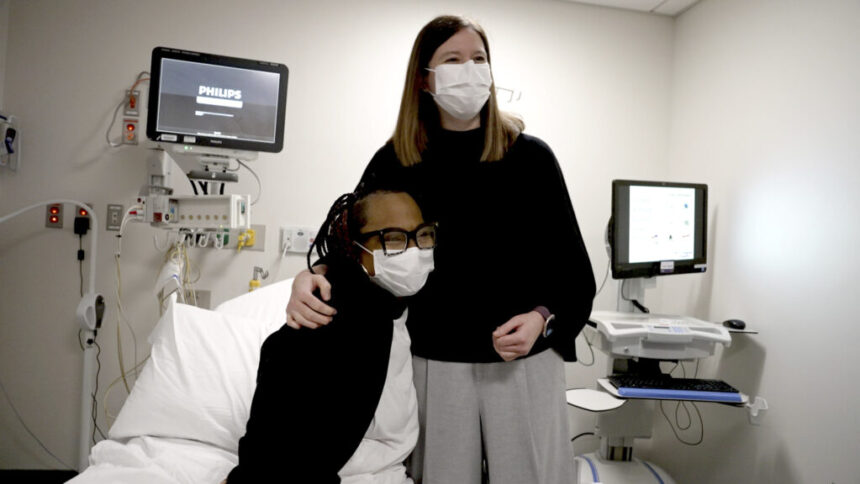An Alabama woman who made medical history by living with a pig kidney for a record 130 days recently had the organ removed after her body started rejecting it. Towana Looney, from Gadsden, Alabama, is now back on dialysis, marking a setback in the field of animal-to-human transplants.
Looney underwent the groundbreaking transplant at NYU Langone Health on April 4. Despite the disappointing outcome, she expressed gratitude for being part of the research and believes that her experience can benefit others struggling with kidney disease.
The use of genetically altered pigs for organ transplants aims to address the critical shortage of transplantable human organs. With over 100,000 people on the U.S. transplant list, the majority in need of a kidney, the demand far exceeds the supply, leading to thousands of deaths while waiting for a suitable donor.
Before Looney, only four other Americans had received experimental xenotransplants of gene-edited pig organs, with none lasting longer than two months. With Looney’s case, researchers are now exploring these transplants in slightly less critically ill patients in hopes of achieving better outcomes.
Despite being on dialysis since 2016 and not qualifying for a regular transplant due to her body’s rejection of human kidneys, Looney opted for a pig kidney. The organ functioned well for a significant period, but her body eventually began rejecting it in early April.
Dr. Robert Montgomery, the pioneer behind Looney’s surgery, explained that the circumstances leading to the rejection are under investigation. The decision to remove the kidney was deemed less risky than attempting to save it with higher doses of anti-rejection drugs.
Rejection is a common challenge in all types of organ transplants, and finding the right balance of immune-suppressing drugs is crucial for preserving the new organ while protecting the patient from infections. Xenotransplantation poses an even greater challenge due to the need for immune-suppression and the potential for various forms of rejection.
Looney’s experience offers valuable insights for future clinical trials in xenotransplantation. Dr. Montgomery emphasized the importance of incremental progress in making these transplants successful, highlighting the need for ongoing research and collaboration in the field.
As the quest for animal-to-human transplants continues, Looney’s journey serves as a reminder of the complexities and challenges involved in pushing the boundaries of medical science. Her courage and resilience in the face of adversity are a testament to the ongoing pursuit of innovative solutions to improve the lives of those in need of organ transplants. The world of technology is constantly evolving and one of the most exciting advancements in recent years is the development of artificial intelligence (AI). AI has the potential to revolutionize industries, improve efficiency, and enhance our daily lives in ways we never thought possible. From self-driving cars to virtual personal assistants, AI is already making an impact in various sectors.
One area where AI is particularly promising is in the field of healthcare. With the ability to analyze vast amounts of data quickly and accurately, AI can help healthcare providers make more informed decisions and provide better care to patients. For example, AI-powered diagnostic tools can help doctors identify diseases and conditions earlier, leading to faster and more effective treatment.
AI is also being used to improve patient outcomes through personalized medicine. By analyzing a patient’s genetic makeup and medical history, AI can help doctors tailor treatment plans to each individual, increasing the likelihood of successful outcomes. This level of personalization was once thought to be impossible, but AI is making it a reality.
In addition to improving patient care, AI is also helping to streamline administrative tasks in healthcare. From scheduling appointments to managing medical records, AI-powered systems can automate many time-consuming processes, allowing healthcare providers to focus more on patient care. This not only saves time and resources but also reduces the risk of human error.
Another exciting application of AI in healthcare is in the development of new treatments and drugs. By analyzing data from clinical trials and research studies, AI can help researchers identify patterns and insights that may lead to breakthroughs in medicine. This has the potential to accelerate the pace of drug discovery and bring new treatments to market faster.
Despite the many benefits of AI in healthcare, there are also challenges that need to be addressed. Privacy and security concerns, as well as the ethical implications of using AI in healthcare, are important considerations that must be carefully thought out. Additionally, there is a need for proper regulation and oversight to ensure that AI is used responsibly and ethically.
Overall, the potential of AI in healthcare is vast and exciting. From improving patient care to accelerating drug discovery, AI has the power to transform the healthcare industry in ways we never thought possible. As researchers and developers continue to innovate and push the boundaries of what is possible with AI, the future of healthcare looks brighter than ever.








